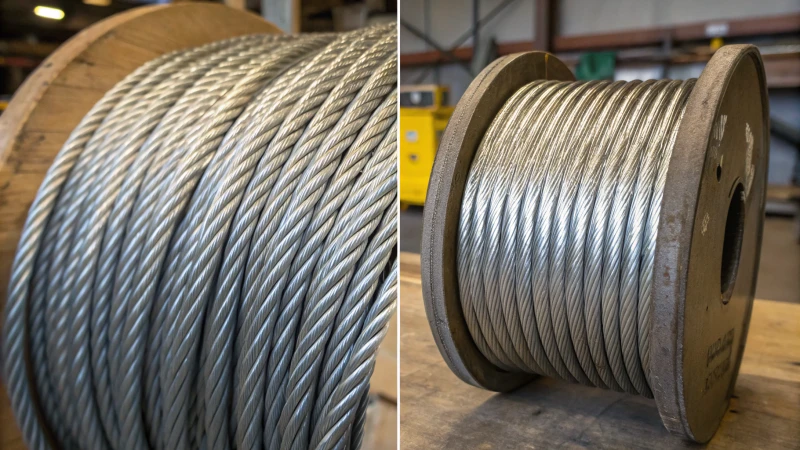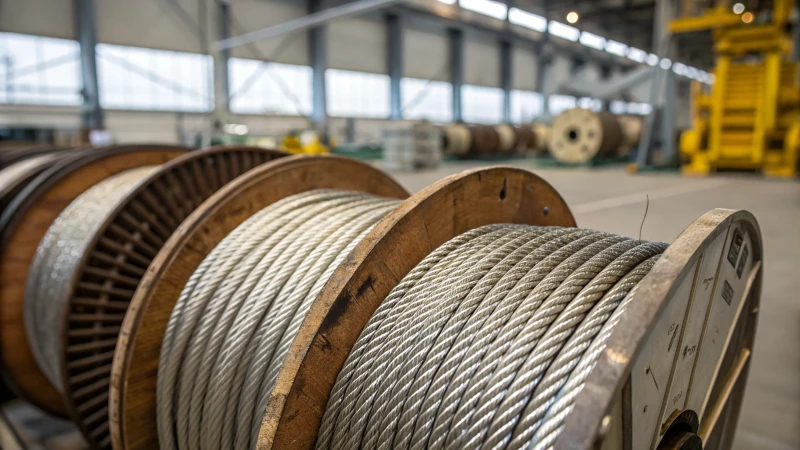
Ever found yourself stuck choosing between galvanized and coated steel wire ropes?
Galvanized steel wire ropes are great for moderate conditions with their corrosion resistance, but they can wear out faster in abrasive settings. Coated ropes, like those with PVC or polyurethane, offer better protection and last longer, though they’re pricier. Knowing these differences helps pick the right rope for the job.
I remember a project where the weather was relentless—rain one minute, scorching sun the next. That’s when I truly understood the importance of picking the right wire rope. Galvanized ropes seemed promising with their rust-resistance, but every scratch told a different story in harsh conditions. On the other hand, coated ropes, although they had a heftier price tag, were like the superheroes we needed—tough and long-lasting against abrasions.
Understanding how each type of wire rope performs in different settings can save you from a lot of headaches down the road. It's about knowing where you stand and what your project demands.
Galvanized ropes are cheaper than coated ropes.True
Galvanized ropes generally cost less due to simpler production processes.
Coated ropes offer better abrasion resistance than galvanized ropes.True
Coated ropes have materials like PVC that enhance abrasion protection.
What Makes Galvanized Ropes Different from Coated Ropes in Corrosion Resistance?
Ever stood at a crossroad, deciding between galvanized and coated ropes for your project? Let me share why this decision matters.
Galvanized ropes are best for moderate environments due to their zinc coating, while coated ropes like PVC or polyurethane excel in high-abrasion settings. Your choice hinges on the specific environmental demands and budget constraints.

Comparing Galvanized and Coated Ropes
I remember the first time I had to choose between galvanized and coated ropes for a project. It felt like picking between two equally compelling options, each with its strengths. Galvanized ropes, with their protective zinc layer, seemed perfect for settings where moisture was present but not overly aggressive. Think of them as the go-to option for moderate environments1 like construction sites or above-ground mining operations. They’re durable but can wear down over time if exposed to heavy abrasion.
On the flip side, coated ropes with PVC or polyurethane felt like the superheroes of high-abrasion environments. I recall a colleague sharing how their polyurethane-coated ropes2 lasted significantly longer than galvanized ones in their industrial setup. These coatings don’t just fend off corrosion; they also shield against physical damage, making them ideal for rough conditions where friction is a constant challenge.
| Rope Type | Corrosion Resistance | Abrasion Resistance | Cost |
|---|---|---|---|
| Galvanized | Moderate | Moderate | Lower |
| PVC-Coated | High | High | Higher |
| Polyurethane-Coated | High | Very High | Highest |
Environmental Impact
Choosing between these ropes also means considering the environment they'll face. In coastal or marine areas, where saltwater can wreak havoc, coated ropes usually have the upper hand due to their enhanced protective layers. Plus, they maintain stability across extreme temperatures, which is a huge plus if you're dealing with unpredictable weather conditions.
Cost Considerations
Now, here's where it gets tricky—coated ropes often come with a higher price tag, sometimes 15-20% more than their galvanized counterparts. This premium might make you pause, especially if you're budgeting for a large-scale project. But weigh the long-term benefits: longevity and reduced replacement costs can often justify the initial expense. So, when you're faced with this decision, consider what will truly be the most economical choice for your needs.
Galvanized ropes resist corrosion better in marine settings.False
Coated ropes outperform galvanized ones in marine settings due to salt protection.
Polyurethane-coated ropes last longer in abrasive conditions.True
They can last up to 50% longer than galvanized ropes in such conditions.
What Are the Cost Implications of Choosing Coated Ropes Over Galvanized Ones?
Choosing the right type of rope for your project isn't just about the initial cost—it's about long-term durability and performance.
Coated ropes tend to be 15-20% more expensive than galvanized ones, mainly because of the extra materials and processing involved. However, their extended lifespan, especially in high-abrasion environments, can lead to significant long-term savings by reducing replacement frequency.

Cost Analysis of Coated vs. Galvanized Ropes
Deciding between coated and galvanized ropes reminds me of a time when I was faced with a similar choice for a major construction project. Initially, the lower cost of galvanized ropes3 was tempting, especially when budget constraints loomed large. But then, I remembered a colleague's story about a project where they went with the cheaper option and ended up paying more in replacements and downtime. This drove home the point that while galvanized ropes are cost-effective upfront, coated ropes, despite being 15-20% pricier, shine with their durability in harsh conditions.
| Type | Cost | Durability |
|---|---|---|
| Galvanized | Lower initial cost | Moderate |
| Coated | Higher initial cost | Superior in harsh conditions |
Longevity and Maintenance
When I think about longevity, coated ropes remind me of that trusted pair of boots that have seen countless adventures—they just keep going! In abrasive environments, they can last up to 50% longer than their galvanized counterparts. This means fewer replacements and less downtime—a crucial factor I consider when managing tight project timelines. Plus, with less maintenance required, there's a notable reduction in labor costs, which has a direct impact on operational efficiency.
Application-Specific Considerations
One size doesn't fit all—this couldn't be truer when choosing ropes. I once worked on a marine project where the saltwater environment demanded PVC-coated ropes4 for their corrosion resistance. On another occasion, for a less demanding task, galvanized ropes sufficed with their moderate wear and tear resistance.
In evaluating your overall investment, consider environmental factors, expected lifespan, and maintenance demands alongside the initial price tag. After all, a higher upfront cost might seem daunting at first, but the long-term value coated ropes offer can be well worth it. It’s also vital to assess supplier offerings; many provide warranties or service agreements that can save costs associated with unexpected failures or replacements. Look for suppliers who offer detailed specifications and robust support to ensure you select the right rope type for your needs.
Coated ropes last 50% longer in abrasive conditions.True
Coated ropes offer superior durability, reducing replacement frequency.
Galvanized ropes require more maintenance than coated ones.True
Coated ropes demand less upkeep, lowering labor costs and downtime.
Which Type of Wire Rope Offers Better Durability in Harsh Environments?
Choosing the right wire rope can be daunting, especially when dealing with harsh environments that push materials to their limits. Let's dive into the options and see which rope holds up best.
For challenging conditions, I recommend opting for coated wire ropes like PVC or polyurethane. They offer superior abrasion and corrosion resistance, ensuring better durability and a longer lifespan than standard galvanized ropes.

Understanding Wire Rope Types
When I first started exploring wire ropes, I was amazed at how specialized they are. Just like finding the perfect pair of hiking boots, choosing the right wire rope depends heavily on where you plan to use it. There are a few main contenders: galvanized steel, PVC-coated, and polyurethane-coated ropes. Each has unique traits that can make or break their performance in specific settings.
Galvanized Steel Ropes: These were my go-to for quite a while because they're like the reliable old friend you know will get the job done in moderate conditions. But throw them into a super abrasive environment, and you'll find they wear down quicker than you'd like.
PVC-Coated Ropes: I remember using these in a project where abrasion5 was a significant concern. The PVC coating acts like a protective jacket, keeping the core safe from wear and tear.
Polyurethane-Coated Ropes: These are the heavyweights in durability. I’ve used them in some demanding applications where resistance to both abrasion and harsh chemicals was a must. They really do stand the test of time.
Performance in Varied Environments
Reflecting on various projects, I've noticed that polyurethane-coated ropes tend to outperform others in terms of longevity and wear resistance:
| Type | Corrosion Resistance | Abrasion Resistance | Durability in Harsh Environments |
|---|---|---|---|
| Galvanized Steel | Moderate | Low | Moderate |
| PVC-Coated | High | High | Good |
| Polyurethane-Coated | Very High | Very High | Excellent |
Take mining operations, for instance. I've seen firsthand how exposure to moisture and abrasion6 can quickly take a toll on lesser ropes. Polyurethane-coated ropes consistently offer up to 40% improved wear resistance, which makes a world of difference.
Cost Considerations and Trade-offs
Now, I won't sugarcoat it—coated ropes do come with a higher upfront cost, about 15-20% more than galvanized ones. But in my experience, their extended lifespan and reduced need for maintenance often lead to significant long-term savings.
For construction managers like John7, investing in these ropes might mean fewer replacements and less operational downtime, which is music to any project manager's ears.
Trade-off Analysis:
- Initial Cost: Higher for coated ropes
- Long-term Savings: Significant due to reduced replacements
- Operational Efficiency: Improved due to higher durability
As procurement managers, it's essential to weigh these factors carefully against your specific needs. For more insights into how coated wire ropes can fit your applications, take a look at our website8.
Polyurethane-coated ropes have very high abrasion resistance.True
Polyurethane coatings provide excellent durability and wear resistance.
Galvanized steel ropes outperform others in harsh environments.False
They offer moderate durability, less than coated ropes in harsh conditions.
How do I choose the right wire rope for my industry needs?
Ever stood in front of a towering spool of wire rope and wondered, "How on earth do I pick the right one for my job?" I’ve been there, juggling specs and safety.
To choose the right wire rope, assess factors like load capacity, environmental conditions, and necessary coating types. Ensure the rope's flexibility, strength, and resistance to wear and corrosion for top-notch performance.

Evaluating Load Capacity and Strength Requirements
I remember standing at a construction site, squinting at the specs of a wire rope. It was one of those "ah-ha" moments when I realized that not all ropes are created equal. Load capacity is key. You’ll want to consider:
- Diameter and Construction: Picture thicker ropes as your trusty heavyweight champions—they can support more.
- Material: Steel ropes are like the superheroes of the rope world—tough and unyielding, perfect for harsh environments like mines.
- Breaking Strength: Always choose a rope whose breaking strength surpasses your maximum load needs, just like making sure your safety net is stronger than your biggest leap.
Like when I opted for a steel wire rope9 with a 1-inch diameter—it was perfect for hoisting those hefty beams.
Understanding Environmental Conditions
Back when I was sourcing for a marine project, corrosion was my arch-nemesis. Different environments require special considerations:
- Corrosive Environments: Galvanized or stainless steel ropes are like knights in shining armor against rust in wet or salty conditions.
- High Abrasion: When dealing with rugged terrain, PVC or polyurethane coatings are your rope’s armor.
Once, I chose a galvanized steel wire rope10 for a site with unpredictable weather, which turned out to be a game-changer.
Flexibility vs. Durability
In my early days, I learned the hard way about balancing flexibility and durability. It’s like picking between sneakers and hiking boots:
- Flexible Ropes: These are your go-to for dynamic tasks, like elevators that need agility.
- Durable Ropes: Think of them as your steadfast cranes—they thrive on stability.
Here's a handy table summarizing applications and recommended rope types:
| Application | Recommended Rope Type |
|---|---|
| Cranes | Galvanized steel |
| Marine | Stainless steel |
| High Abrasion | Polyurethane-coated |
| Flexible Use | Nylon-core |
Safety Standards and Certifications
Safety standards are the backbone of any good purchase. Trust me, checking for compliance is like checking if your parachute is packed correctly.
- ISO Certifications: Always ensure your supplier's products are ISO-compliant.
- Local Regulations: Adhere to your industry's safety standards to avoid any hiccups.
Just like verifying ISO certification11 can assure you’re getting the best quality.
Steel wire ropes are ideal for high-abrasion environments.False
Steel is strong but not specifically abrasion-resistant like coated ropes.
ISO certification ensures wire rope quality and safety.True
ISO standards provide guidelines for consistent product quality and safety.
Conclusion
Galvanized steel wire ropes are cost-effective for moderate conditions, while coated ropes provide superior abrasion and corrosion resistance, lasting longer but at a higher price.
-
Explore environments where galvanized ropes excel due to their corrosion resistance capabilities. ↩
-
Learn how polyurethane coatings enhance rope durability in high-abrasion environments. ↩
-
Understand how initial costs differ between galvanized and coated ropes for budgeting purposes. ↩
-
Learn why PVC-coated ropes are superior for marine applications to prevent corrosion. ↩
-
Discover how polyurethane-coated ropes provide enhanced abrasion resistance, making them ideal for harsh environments. ↩
-
Discover how polyurethane-coated ropes provide enhanced abrasion resistance, making them ideal for harsh environments. ↩
-
Learn how John prioritizes wire rope durability and reliability for construction projects in challenging conditions. ↩
-
Visit WonBon's site for detailed information on durable wire ropes suitable for various harsh environments. ↩
-
Find detailed specifications and applications for 1-inch diameter steel wire ropes, helping you determine their suitability for heavy lifting. ↩
-
Explore the benefits of using galvanized steel wire ropes in construction to resist weather elements. ↩
-
Learn about ISO certifications that guarantee the quality and reliability of wire ropes. ↩

